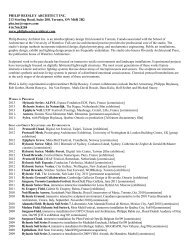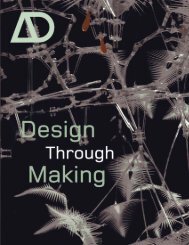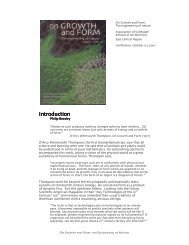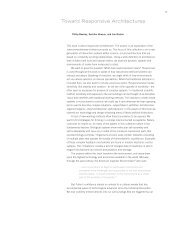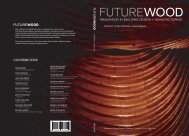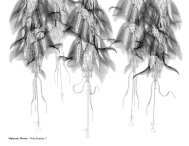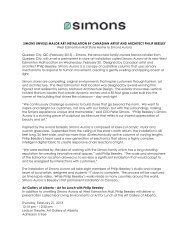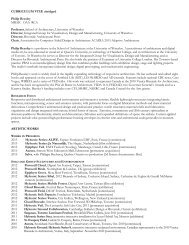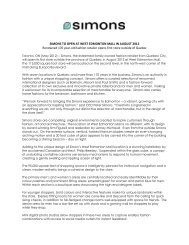Mobile Nation - Philip Beesley
Mobile Nation - Philip Beesley
Mobile Nation - Philip Beesley
You also want an ePaper? Increase the reach of your titles
YUMPU automatically turns print PDFs into web optimized ePapers that Google loves.
<strong>Mobile</strong> <strong>Nation</strong><br />
creating methodologies for mobile platforms<br />
Sara Diamond and Martha Ladly<br />
Ontario College of Art & Design<br />
Dialogues about commercial applications for the mobile platform, new<br />
technological innovations, and market development often occur in separate<br />
forums unrelated to scholarly dialogues about the sociology of mobile<br />
use and creative practices outside of the contemporary commercial market.<br />
Researchers, developers, and investors in these areas all have specific<br />
approaches that they seldom have an opportunity to share. For this reason,<br />
this <strong>Mobile</strong> <strong>Nation</strong> anthology brings together very different communities<br />
to share a dialogue about their methodologies and approaches to this<br />
growing field. Our hope with it is to foster an increased capacity to work<br />
together to build the creative, technical, and social capacity that mobile<br />
computing will bring. The <strong>Mobile</strong> <strong>Nation</strong> conference, upon which this<br />
anthology is based, provided an innovative and rigorous context within<br />
which to consider appropriate research methods, including their epistemology<br />
and their application. It also offered an opportunity to develop<br />
new and appropriate methodologies for this challenging, complex, and<br />
important field of inquiry.<br />
Researchers have created platforms such as cellular telephones, MP3<br />
devices, and PDAs, and these have become leading consumer products.<br />
They have invented communications technologies such as Wi-Fi and<br />
Bluetooth, sensor systems such as Radio Frequency Identification (RFID)<br />
and GPS, and networks (such as personal area networks). These in turn<br />
enable the development and combination of new tools to create content.<br />
Examples include new forms of fashion that can respond to social context,<br />
environment, or wearer, and new architectural expressions such as<br />
interactive billboards. Other researchers are analyzing this growing<br />
mobile phenomenon from a social and business perspective.<br />
The wider context of increasingly social media sets the stage for the<br />
current growing collaboration of artists, scientists, designers, and engineers.<br />
The challenges of designing mobile experiences and technologies are<br />
many, requiring teams with a range of disciplinary knowledge and skill, as<br />
well as the ability to manage constant changes in platforms, complexity<br />
of programming languages and challenges of building content appropriate<br />
to mobile devices. There are added challenges when the content is locationbased<br />
rather than generic, or collaborative rather than individual. This<br />
framework requires the expansion of hardware and the development of<br />
interactive capacity, hence significant code development and the creation<br />
of interactive content, all within a context of understanding and anticipating<br />
users’ cultures and practices.<br />
The <strong>Mobile</strong> <strong>Nation</strong> conference created an environment for researchers,<br />
companies working in mobile content and technology development,<br />
and users of the resulting products to share their interests and their<br />
actual approaches to conducting research in this fast-changing field. For<br />
example, effective research for a mobile experience that occurs outdoors<br />
requires that a mixed team of content creators, such as game designers,<br />
documentary producers, or creators of mobile walking tours, work<br />
closely with engineers to brainstorm, build, and test their designs with<br />
users on site. They must consider the actual physical location as their<br />
set, with all of its possibilities and technical limits, instead of working<br />
in the studio. They must understand the limits of GSM coverage and<br />
GPS accuracy and undertake actual engineering at the location of the<br />
intended experience.<br />
The <strong>Mobile</strong> <strong>Nation</strong> anthology surveys five broad themes:<br />
1. Participatory culture, ethnography, participatory design,<br />
and the end-user<br />
2. Creating for the multi-platform context and challenges<br />
of media and place<br />
3. Pervasive and social computing<br />
4. <strong>Mobile</strong> communication and education<br />
5. Engineering methodologies and solutions meeting<br />
humanities and social science approaches<br />
More specifically, <strong>Mobile</strong> <strong>Nation</strong> considers how we can meet the challenge<br />
of integrating variable media (television and mobile for example)<br />
into the specifics of place; how we design for technical platforms where<br />
we expect to communicate and share content, with ethnography and<br />
participatory design providing specific tools for researchers and industry<br />
alike; how mobile media serve the changing context of informal and<br />
formal education; how ubiquitous computing (or ubicomp) results in the<br />
reorganization of social experiences; and how, in turn, this field can benefit<br />
from mobile capacities, that is, how new designs engage physical environments,<br />
whether built or worn. Finally, it asks how social scientists’<br />
methods of analysis of behaviours, particularly of adoption and usage patterns,<br />
can be combined with engineering solutions to build better research<br />
and innovation, and more marketable products.<br />
Working Methods<br />
By providing a focus on ‘methodologies,’ the conference threw an international<br />
light on mobile research and commercialization, afforded opportunities<br />
for high-level exchange between national and international players,<br />
and highlighted the work of leaders in the field of mobile scholarship. For<br />
this reason <strong>Mobile</strong> <strong>Nation</strong> attracted a diverse group of individuals from<br />
1 MOBILE NATION<br />
2




![Digital Architecture Now - Neil Spiller [Publication] - Philip Beesley](https://img.yumpu.com/51382552/1/190x214/digital-architecture-now-neil-spiller-publication-philip-beesley.jpg?quality=85)
